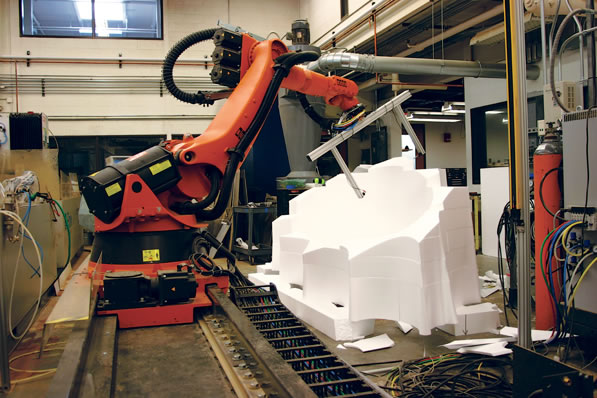The integration of technology and sustainability is the future of the industry. For Monica Ponce de Leon, dean of the University of Michigan’s Taubman College of Architecture and Urban Planning, this means embedding sustainability into the programs while using technology to examine best practices. Budding architects and critics alike are welcoming her approach. In the DesignIntelligence rankings, Taubman’s master of architecture program went from unranked when Ponce de Leon arrived in 2008 to No. 1 just three years later.
A New Focus
Formerly a Harvard professor, Ponce de Leon has implemented numerous changes at Taubman. In addition to the increased emphasis on sustainability and technology, she promotes a global focus and working across disciplines. “The ecological problems of today simply cannot be solved by a single discipline,” Ponce de Leon says. Therefore, she has introduced “team teaching” for specific courses, where students also learn from colleges outside of Taubman, such as the School of Natural Resources.
To further the global approach, students have the opportunity to travel abroad for a semester and study forms of architecture on one of five continents. Ponce de Leon also has made it a point to invite international architects of note to Ann Arbor for speaking engagements and lectures.
Not just critics have noticed Ponce de Leon’s efforts; students understand the program’s timely emphases. Lauren Berby, a third-year master of architecture student, says Ponce de Leon was integral to her decision to attend the college. “I followed Monica’s career prior to applying,” she says, “and the idea of being in a program that she was the leader of was very exciting.”
Advanced Technology
Ponce de Leon renovated the school’s facilities and created a digital fabrication lab, or “FABLab.” “We don’t think that design is about technology,” Ponce de Leon says, “but our students have to be skilled in technology as a way to address and solve larger problems.”

The FABLab features two different kinds of equipment: tools to make building models and machines for creating building fragments. The model tools, such as laser cutters and rapid prototyping machines, can be found at most architecture schools, though Taubman is able to boast a variety of products and sizes. The fragment machines, such as the robotic arm, are far less common because many programs haven’t realized the technology’s necessity. “I think it’s important for our students to be intimately familiar with the equipment and the design implications of fabrication,” Ponce de Leon says. “It connects design to the real world and makes students think about the way construction affects the built environment.”

The largest machine in the FABLab is the 7-axis Kuka Robot.
Access to the FABLab is another appealing feature to potential students. “Learning in the FABLab has taught me a level of architecture that I wouldn’t get on paper,” Berby says. “It adds a creative level, and the skills and hands-on interaction will prepare me for when I move on to a career in architecture.”
Practice Makes Perfect
With the digital world taking over, staying abreast of new technologies isn’t easy. For this reason, and because of her love for the craft, Ponce de Leon has owned an architectural practice since earning her degree in 1991. While some may feel overwhelmed by both endeavors, it’s the only life she’s ever known. “The way we design buildings and construct them is completely different than when I went to school,” Ponce de Leon says. “As a dean, having a practice is fundamental. If you’re not embedded in everyday practice, you can’t understand industry trends.”
Oonce de Leon’s firm, MPdL Studio, has offices in Ann Arbor, New York, and Boston. Previously known as Office dA, Inc., the firm placed fifth on Fast Company’s 2010 list of the “10 Most Innovative Companies in Architecture.” The firm’s projects have garnered attention as well. For example, the Macallen Building, a 150-unit condominium in South Boston, received an Honor Award for Design Excellence in 2009 from the Boston Society of Architects. And the Fleet Library at the Rhode Island School of Design won a 2010 Award for Design Excellence from the AIA New England Design Awards.

The Northeastern University Spiritual Life Center represents the design work that Monica Ponce de Leon manages to find time for amid the demands of serving as dean of the Taubman College. A common space for people of different spiritual, religious, and cultural orientations Ponce de Leon’s design provides for distinct religious faiths while maintaining the necessary neutrality so as not to bias any particular iconography.
Looking to the Future
With a FABLab unmatched by any architecture school in the nation and a deep focus on sustainability, it is clear why Taubman College rose to the top. These efforts are preparing the school’s students for life after graduate school and training them to be aware of the impact their work will have on the built environment. In the past architects focused solely on ease of assembly, but Ponce de Leon also encourages students to notice the sustainable importance of disassembly. In every course at Taubman College, the notion of environmental impact is just as important as creating a utilitarian and aesthetically appealing design.
“Design should be about representing and constructing culture,” Ponce de Leon says. “But we have to do it in a sustainable way and use the best tools available. Otherwise, you run the risk of making it simply a fad, which can be eliminated later.”
——————
This is one part of gb&d’s Technology Symposium. Read more here.

